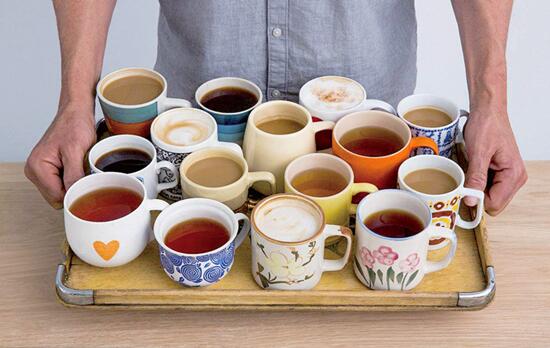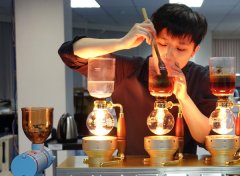Which cup of coffee or tea do you choose between the two flowers?

Professional barista communication, please pay attention to coffee workshop (Weixin Official Accounts cafe_style)
According to Marc Gunter, an epidemiologist at King's College London, a recent study of more than 500,000 people aged 16 and over across Europe showed that those who drank the most coffee had a lower risk of premature death. But what if it was a cup of tea?
Best for longevity: tea
If you want to live longer, turn the kettle on. The findings about coffee published by the National Institutes of Health in 2012 in the New England Journal of Medicine are backed up by the latest research. Men who drank six or more cups of coffee a day had a 10 percent lower risk of death and women had a 15 percent lower risk of death than non-coffee drinkers.
But regular tea drinkers also live longer than the average person. A 2015 study by an Australia team published in the Journal of Clinical Nutrition showed that women aged 70 and 80 who drank two cups of tea a day lived longer.
This may be due to a unique compound in tea that can alter the human gene sequence.
A study published in May in the journal Human Molecular Genetics by Weronica Ek, a researcher at Uppsala University in Sweden, showed that regular drinking of tea (rather than coffee) was strongly associated with epigenetic variations in 28 different gene segments that can affect cancer or estrogen metabolism.
Best for antioxidants: Coffee
Both coffee and tea are loaded with antioxidants called polyphenols, nutrients that help reduce inflammation and repair cell damage. Dr. Bob Arnott, author of the bestselling Coffee Lovers Food List, reveals how to get the most health benefits from beverages: "We already know that inflammation is the culprit behind many diseases such as heart disease and stroke, and polyphenols can help improve this. Coffee has an average polyphenol content of 2.5 times that of tea."
But he cautions that there are striking differences in polyphenol content between brands due to different roasting methods and even different origins of coffee beans. "If you want to get the most polyphenols from your coffee (which is the most beneficial), choose beans grown at high altitudes, such as Nyeri in Kenya."
Best for Heart Health: Tea
Coffee and tea can both help reduce cardiovascular disease. A 2010 study by a Dutch team published in the American Heart Association: Journal of Arteriosclerosis, Thrombosis and Vascular Biology showed that people who drank six or more cups of tea a day had a 36 percent lower risk of heart disease than those who drank less than one cup a day. People who drank two to four cups of coffee a day had a 20 percent lower risk of heart disease than those who drank less.
"Polyphenols can boost your heart health," Dr. Arnott said,"but if you metabolize caffeine more slowly than the average person, it can lead to elevated blood pressure and a faster pulse." So you need to know your caffeine tolerance level and watch the caffeine content when buying coffee at the store. A person can consume up to 400 milligrams of caffeine a day (the equivalent of four espresso cups). Anyone who finds caffeine affecting them--sleep, for example--should not consume more than 200 milligrams per day." An oversized Starbucks American coffee contains 300 milligrams of caffeine.
Best for Digestive System: Coffee
Some patients claim that coffee can trigger irritable bowel syndrome, but whether this is true is not yet known. But researchers at the Norris Comprehensive Cancer Center at the University of Southern California's (USC) Keck School of Medicine reported in April last year that coffee consumption reduces the risk of colorectal cancer.
Best for Weight Loss: Green Tea
If you're following the advice of a fitness magazine and are getting ready for an espresso before a fat-burning workout, the following may make you pause for thought. Black coffee has always been a staple drink for many dieters, but it may do you more harm than good. A study published in April 2011 by the University of Guelph in Canada showed that when a healthy person ate a high-fat meal, blood sugar levels rose; when he ate a high-fat meal and drank caffeinated coffee, blood sugar levels tripled, jumping to levels at risk for diabetes. Saturated fat, fat mixed with caffeinated coffee, impedes the body's ability to remove sugar from the bloodstream, and high blood sugar can cause organ damage, according to research in the Journal of Nutrition.
Euan MacLennan, an NHS herbalist in central London, said there were numerous small studies showing green tea had a role in weight management. A study of 35 obese men and women found that those who drank four cups of green tea a day lost significantly more weight over a two-month period than those who took a placebo.
"Green tea can help lose weight in many ways: promoting thermogenesis (burning calories), promoting fat oxidation (burning fat), reducing fat absorption by the body, and even reducing appetite."
Best for Cholesterol: Tea
Drinking coffee may raise your cholesterol levels. According to a study published in the July 2007 issue of the journal Molecular Endocrinology by Baylor College of Medicine, a compound in coffee called caffeinol hijacks a receptor in the gut that is critical for regulating cholesterol and raises cholesterol levels.
French pressed coffee, Scandinavian brewed coffee and espresso have the highest caffeine content, while other coffee types are better because the caffeine is filtered out by filter paper during the process.
If your cholesterol is higher than normal, drink tea.
Best for refreshing: tea
Coffee is supposed to boost energy, but researchers at Bristol University say the sensation may be an illusion. A study published in June 2010 in the journal Neuropsychopharmacology reported that regular coffee drinkers developed tolerance to anxiety and the stimulating effects of caffeine. Regular coffee drinking may give you a feeling of energy boost, but there is evidence that this is the reversal of the fatigue effects of acute caffeine withdrawal. Caffeine intake also increases the risk of anxiety and elevated blood pressure, so there is no benefit overall.
But a 2011 study by a Portugal team published in Frontiers in Biological Science showed that compounds in green tea can cross the blood-brain barrier, a special barrier between blood and brain tissue that prevents most substances from entering the brain, to neural tissue. "They can help protect neurons (nerve cells)," he said,"and reduce the decline in brain function."
"Research also suggests that theanine, a 'soothing' amino acid unique to green tea, may have memory benefits and slow cognitive decline associated with aging."
Best for bone strength: tea
Because caffeine has a slight "barrier" effect on calcium absorption, coffee is often mistaken for the cause of decreased bone density. In fact, caffeine has such a minimal effect on calcium absorption that a little milk can counteract it.
In contrast, long-standing research has shown that black tea is strongly associated with improved bone strength. But Dr. McLennan says green tea may have even greater benefits.
He cites a 2013 study by a Texas team published in the American Journal of Clinical Nutrition: "catechins, a compound rich in green tea, reduce the number of osteoclasts (cells that break down bone) in the body and increase the number and activity of osteoblasts (cells that make bone). Green tea can also help if you have a broken bone and want to speed up the healing process."
Coffee doesn't seem to improve bone strength, but caffeine boosts muscle strength in older adults, according to a report published in june 2012 by exercise scientists at coventry university at the british society for experimental biology. Therefore, a cup of coffee can help older people maintain their strength and reduce the chances of falls and injuries.
Important Notice :
前街咖啡 FrontStreet Coffee has moved to new addredd:
FrontStreet Coffee Address: 315,Donghua East Road,GuangZhou
Tel:020 38364473
- Prev

2017 International Coffee Festival, four coffee trends, day night lively debut
Professional barista exchanges, please pay attention to coffee workshop (Weixin Official Accounts cafe_style) Asian coffee consumption has continued to rise in recent years. On average, Taiwan drinks 122 cups of coffee per person a year. Accupass activity wind balloon statistics show that there are more than 300 activities in the name of coffee in 2017, showing that Taiwanese people are highly interested in coffee-type activities. Response International Co
- Next

California coffee may need to be labeled "carcinogenic" after protracted litigation
Professional barista exchanges, please pay attention to coffee workshop (Weixin Official Accounts cafe_style) In California in the future, maybe when you take a sip of coffee, you will feel nervous. According to NBC News, a nonprofit group wants coffee manufacturers, distributors and retailers to label every coffee with a warning that brewed coffee contains carcinogenic chemicals.
Related
- The ceremony is full! Starbucks starts to cut the ribbon at a complimentary coffee station?!
- A whole Michelin meal?! Lucky launches the new "Small Butter Apple Crispy Latte"
- Three tips for adjusting espresso on rainy days! Quickly find the right water temperature, powder, and grinding ratio for espresso!
- How much hot water does it take to brew hanging ear coffee? How does it taste best? Can hot water from the water dispenser be used to make ear drip coffee?
- What grade does Jamaica Blue Mountain No. 1 coffee belong to and how to drink it better? What is the highest grade of Blue Mountain coffee for coffee aristocrats?
- What are the flavor characteristics of the world-famous coffee Blue Mountain No. 1 Golden Mantelin? What are the characteristics of deep-roasted bitter coffee?
- Can I make coffee a second time in an Italian hand-brewed mocha pot? Why can't coffee be brewed several times like tea leaves?
- Hand-brewed coffee flows with a knife and a tornado. How to brew it? What is the proportion of grinding water and water temperature divided into?
- What is the difference between Indonesian Sumatra Mantinin coffee and gold Mantinin? How to distinguish between real and fake golden Mantelin coffee?
- What does bypass mean in coffee? Why can hand-brewed coffee and water make it better?

